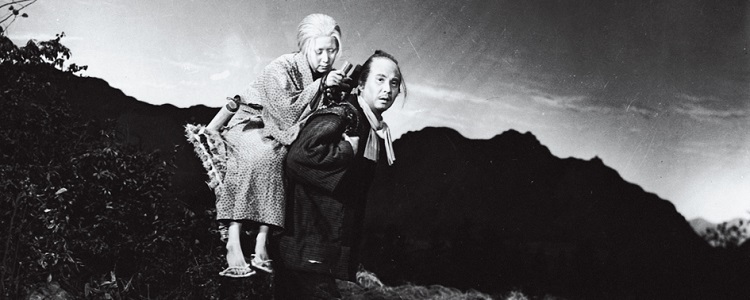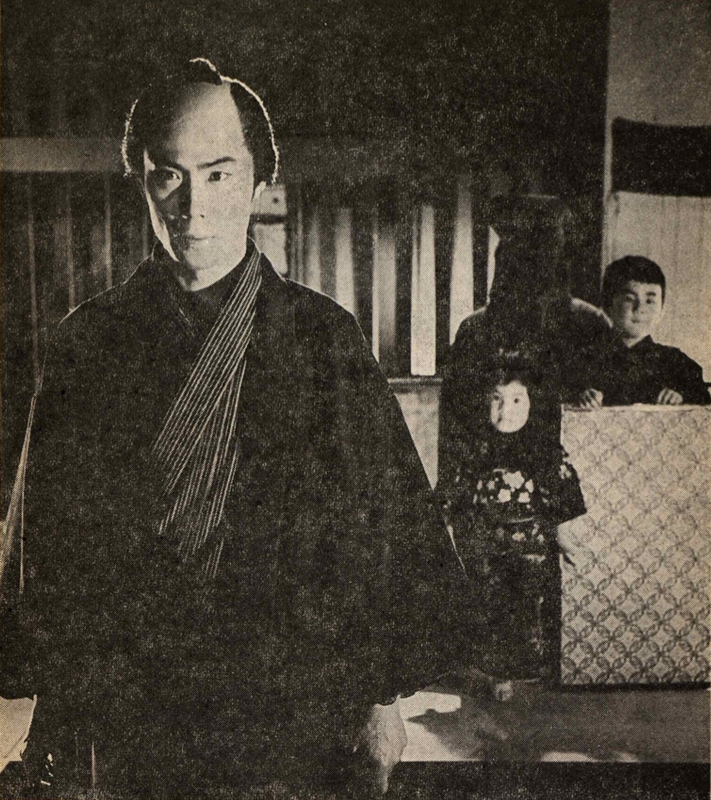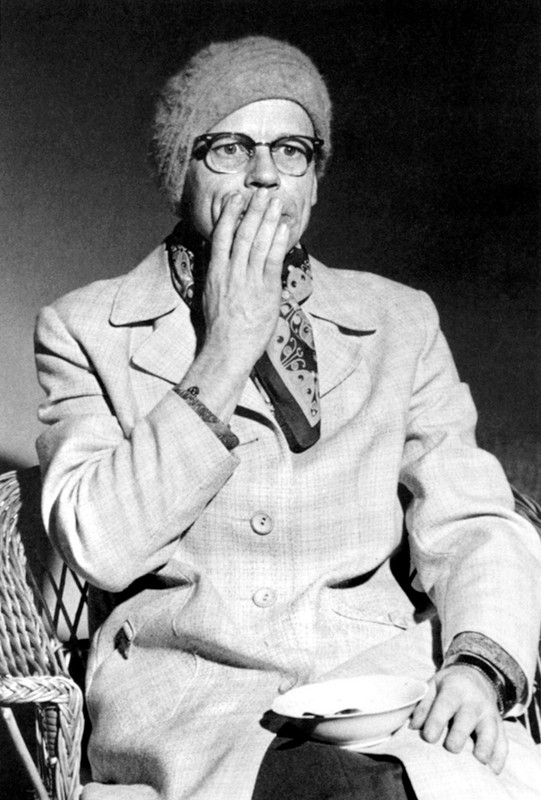“The madwoman has received your grace.”L'amore (Roberto Rossellini, 1948)
Apr
22
alms

Nannina (Anna Magnani) in “Il miracolo”, ascending a staircase while eating her alms. DP of this segment: Aldo Tonti; DPs “Una voce umana”: Robert Juillard & Otello Martelli.
– Nannina
theatre
“This winter… I'm going to the mountain. My mother went to the mountain, as did the mother-in-law of our home. So I have to go too.”楢山節考 [Narayama-bushi kō / The Ballad of Narayama] (Keisuke Kinoshita, 1958)
Dec
11
International Mountain Day

Tatsuhei (Teiji Takahashi) with his mother Orin (Kinuyo Tanaka) in a bamboo carrier on his back. She's combing his hair. Around them the mountain range. DP: Hiroshi Kusuda.
Travel mountains on International Mountain Day
A starving community has come to the agreement that the elders approaching the age of seventy are to be carried up Narayama mountain to die. The day prior to the mountain's festival, sixty-nine year old Orin prepares to leave, carried by her son Tatsuhei.
– Orin
In Keisuke Kinoshita's highly stylised 楢山節考, the arguably cruel (and most likely fictional) practice – of 姥捨て [ubasute, abandoning an old woman] – is superbly abstracted. Narration, dramatic lighting, colour filters and very obviously a soundstage underline that what we're watching is not a film, but a kabuki play.
– Get the Ouija board. – It's got the Bible on top of it, keeping it quiet. “Bet you can't eat just one.” “Now, until the break of day,
Through this house each fairy stray…” “What you call sin, I call the great spirit of love, which takes a thousand forms.”The Bat Whispers [The Bat] (Roland West, 1930)
Nov
19
Play Monopoly Day

Board and planchette at the ready for a little game of Ouija. DPs: Ray June (23mm) & Robert H. Planck (70mm).
Play a board game on Play Monopoly Day (USA)
It's just a little game. But then you wonder if Ouija, the Wonderful Talking Board is actually just that. Two neat little ladies playing that quirky 1891 novelty game in Roland West's The Bat Whispers summon the aforementioned bat, black-clad fiend and Batman predecessor.
Who is he? What does he want? And how can he be stopped? Do you know the answer?
YES
NO
GOOD BYE
心中天網島 [Shinjū: Ten no Amijima / Double Suicide] (Masahiro Shinoda, 1969)
Oct
10
International Stage Management Day

Jihei (Kichiemon Nakamura ) and his children with a stagehand visible between them. DP: Tōichirō Narushima.
心中天網島 is based on a 1721 文楽 [#bunraku] puppet theatre play]. As traditional in this style of theatre, the puppeteers are in full view of the audience wearing all-black cloaks. 心中天網島 does the same, but substitutes the puppets with flesh and blood actors.
The puppeteers are 黒衣 [kuroko, litt. “black clad”, though there are colour variations depending on the scene's requirements], guiding the performers towards their destiny.
Dutchman (Anthony Harvey, 1966)
Oct
3
Mean Girls Day

Clay (Al Freeman Jr.) reading a newspaper and minding his business on a subway train home. Just arrived on his car is Lula (Shirley Knight) and her endless supply of apples. DP: Gerry Turpin.
The haunting retelling (beware of spoilers) of #Wagner's The Flying Dutchman.
– advertising slogan
Медвежья свадьба [Medvezhya svadba / The Bear's Wedding] (Konstantin Eggert + Vladimir Gardin, 1925)
Sep
28

In preparation of the bear's wedding, a cook – wearing not much more than an apron and a toque blanche – stirs a huge kettle over a roaring fire. DPs: Eduard Tisse & Pyotr Yermolov.
U bent mijn moeder (Horst Königstein, 1984)
Sep
21
World Alzheimer's Day

Joop Admiraal in the role of his mother. During the monologue, the actor switches character and props.
A Midsummer Night's Dream (William Dieterle + Max Reinhardt, 1935)
Jun
10
Superman Week

Oberon (Victor Jory) – King of the Fairies – on his horse with Puck (Mickey Rooney) – a trickster sprite. While they ride of, Oberon's cape flows behind them through the trees, supported by the fae. A lot of the other-worldly fairy sparkle was accomplished by generous amounts of DuPont® cellophane and cinematographer Hal Mohr's contribution of trimming the trees with aluminium paint, cobwebs, and small metal particles. DP: Hal Mohr.
Capes, cloaks, and mantles are everywhere in Dieterle and Reinhardt's lavishly outfitted A Midsummer Night's Dream. The dreamlike #CostumeDesign by Max Rée and the uncredited Milo Anderson is as much as a personality as #Shakespeare's characters are.
– Oberon, Act 5, Scene 1
Any reports of Kenneth Anger's presence as the Changeling Prince are greatly exaggerated.
Mädchen in Uniform [Girls in Uniform] (Leontine Sagan + Carl Froelich, 1931)
May
9
Teacher Appreciation Day

Manuela (Hertha Thiele) in her Don Carlos costume with her beloved teacher, Frl. Von Bernburg (Dorothea Wieck). Note the similarity with Garbo vehicle Queen Christina (Rouben Mamoulian, 1933). DPs: Reimar Kuntze & Franz Weihmayr.
A goodnight #kiss on the lips was all it takes for 14-year old Manuela to fall for her teacher, Fräulein Von Bernburg. Then, while celebrating her rousing performance as the male lead in the play Don Carlos, Manuela gaily blurts out that yes, she indeed is in love with her teacher! This lack of discipline can't go unpunished, with devastating results.
– Fräulein Von Bernburg
Mädchen in Uniform with its all-female cast was, no… is!, a daring sapphic romantic drama based on a wildly popular play by Christa Winsloe. After multiple well attended screenings the film got banned in Germany because of its anti-authoritarian undertones, and almost banned in the US because of its lesbianism. Thankfully one of the picture's admirers – Eleanor Roosevelt – stepped in, resulting in a limited release.
